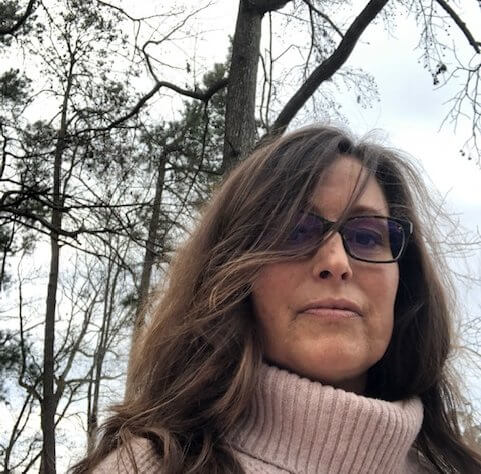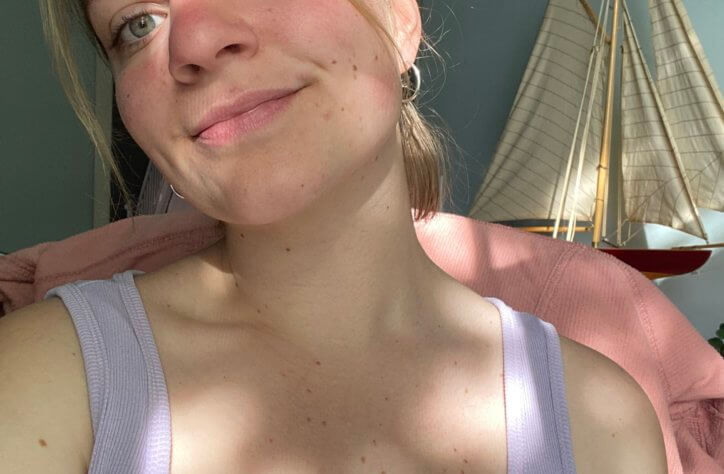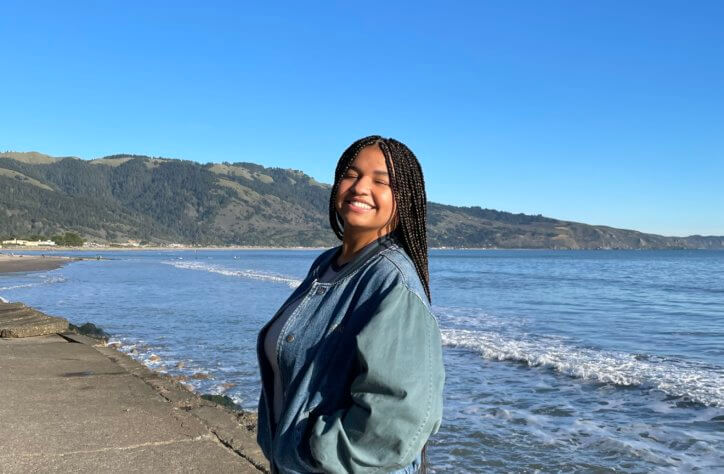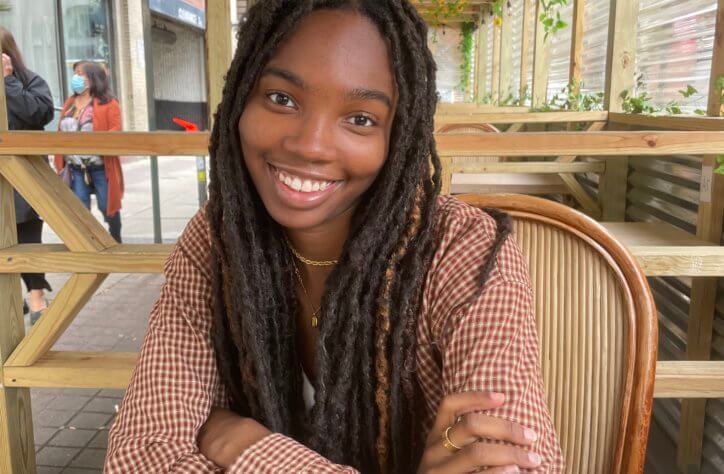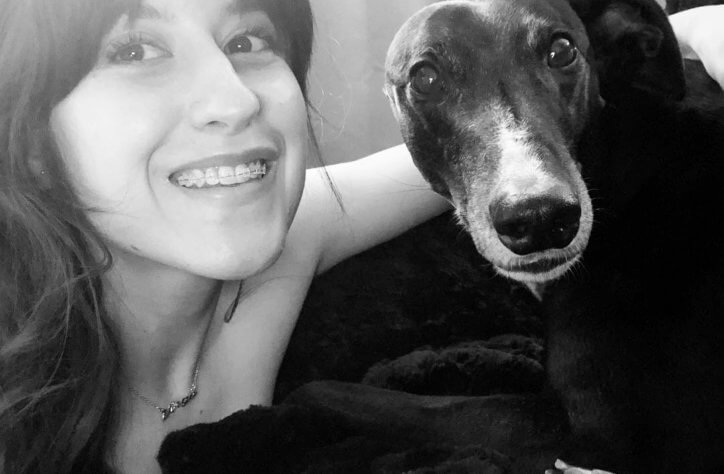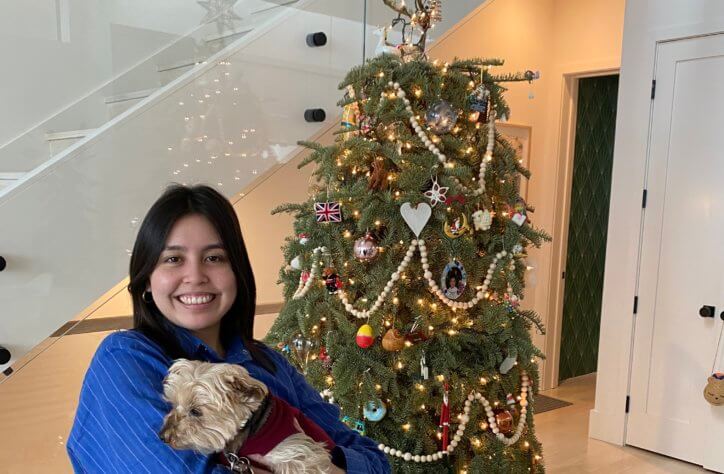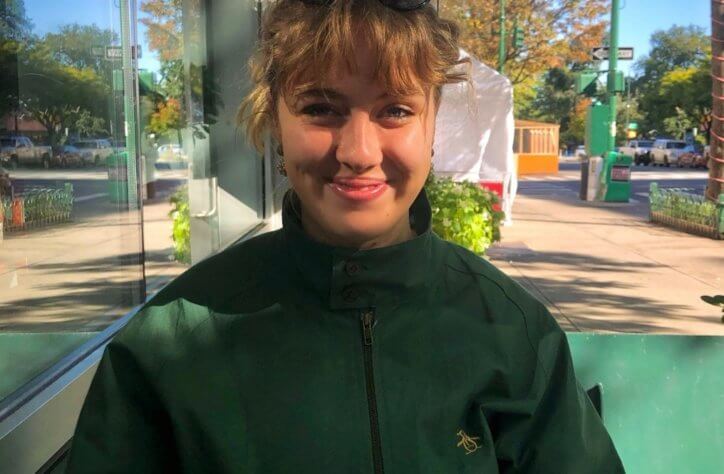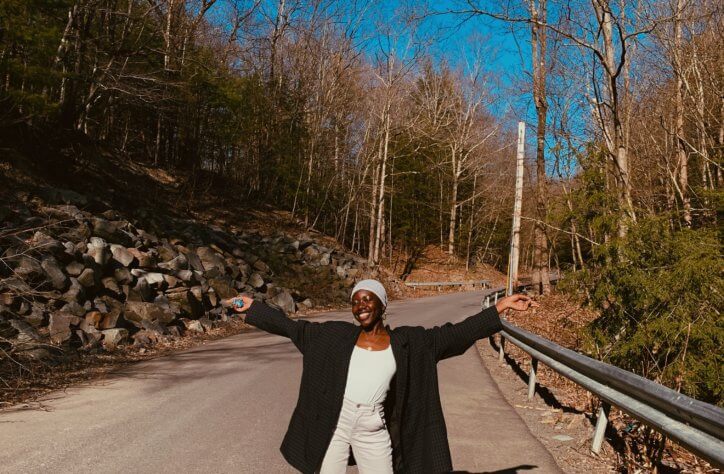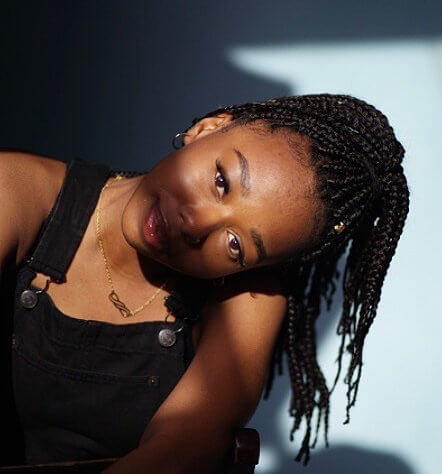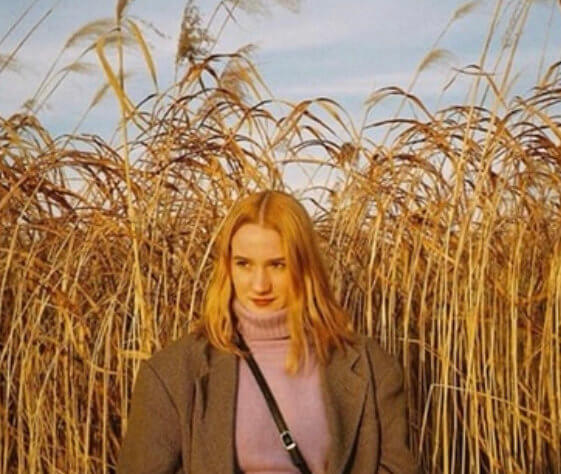The evening sun shines through the trees and projects itself onto the wall. The shadows sway over the light, crossing paths, moving together as one. ‘Nature is like a dance,’ I think to myself. I think about what would feel like to be a part of this union ─ and then I remember that I am. How good it feels to closely observe nature, how intimate, how sensual, how grounding, to observe something with detached curiosity, without judgement. And then I think about the body-scan meditation I sometimes do in the morning, the woman speaking in a steady, sedative voice, ‘and without trying to change anything, but just recognising what is there.’ It’s not as easy as it sounds. I would like to look at myself the way I look at nature ─ something that seemed to come naturally when I was younger ─ before my self-awareness turned into self-consciousness and insecurities began to bury themselves in my body. But like anything, it can be helped, so I do my body-scan and try to remind myself that I too am a part of nature. After all, the Earth is a woman.
I have to meditate now, to feel present, though my mind still wanders, even when I’m making a conscious effort for it not to. The skill is directing your thoughts back to your breath. Humans don’t learn to time travel as we get older, but our minds are constantly going from the past to the future, then back to the past. I find it funny that we have apps now, for meditation. I feel like phones are ruining our attention spans. There’s always something interesting to look at on them ─ they’re literally designed to be stimulating/addicting. We use meditation apps as a way to disconnect, to tune into our bodies without having to turn off our phones.
I find it really strange/worrying how many children have smartphones now. Every time I think about it, my stream of consciousness goes a little like this:
‘This is absolutely ridiculous! Being present is one of childhood’s greatest gifts. A smartphone pales in comparison and would undoubtedly cause more harm than good. Children have only just begun to dip their toes into the real world, and we already want to expose them to a virtual one? Give them a chance to smell the roses, to take in their surroundings with hungry eyes, open minds and tender hearts. How can you possibly be present if you’re always in two places at once?’
I remember making daisy chains as a young girl, how I spent my summer days sitting on our picnic rug with my legs crossed over each other like a pretzel, picking each and every long-stemmed daisy in my vicinity, carefully and purposefully joining them together until my creation was complete. I remember the feeling of pressing my thumbnail into the stem, feeding the next daisy into the slit, like threading a needle, repeating the process, over and over, like saying the Rosary, and then, when it was finished, placing it on the grass and leaving it there, like an offering.
I remember walking barefoot on the beach beside my granny’s house, how the sand would get in between my toes, how we would paddle in the rock pools before putting our flip flops back on. I remember the sound they made as we walked back down the lane, our stomachs rumbling like thunder, moving closer to the house.
We’d walk in and the house would be alive with aroma. There’d be pots and pans spread across the surface of the stove and ingredients covering every inch of the counter. My granny would be working away in the kitchen; making lots, wasting little. She knew the recipes by heart, so much so that she never needed to write them down. Like a song she’d been singing since she was a child or the prayer she grew up reciting, the recipes were as much a part of her as they were the women who passed them down to her. And we always wanted to hear her sing it again, again, again.
I remember the floury, fluffy, buttery, boiled potatoes, the fish that practically fell off the bone, the steamed broccoli and carrots that somehow tasted better than any vegetables I’d ever eaten, and the hollandaise sauce made it all melt in your mouth. I remember how I savoured every morsel, every mouthful, every moment of the meal until we would all begin to chime, as if on cue, variations of ‘thank you for the meal.’ Between the sea air and the beautiful food, we’d all sleep like babies come nightfall.
I can’t remember the last time I made a daisy chain or walked barefoot in the sand or enjoyed a meal as thoroughly as I did in my granny’s when I was younger. I’d forgotten the pleasure simply being present can give. It’s true that children tend to find joy in the smallest of things, things that adults have learned to take for granted. Children aren’t worried about the future. Children don’t live in the past. If anything, writing this serves as a reminder to myself to try and live in the moment as much as possible. Of course, adults do need to spend a bit more time thinking about the future/forward-planning, and a healthy dose of nostalgia won’t do any harm either! But I don’t want to forget the way it feels to be present, to enjoy right now, today.
And then a stream of ideas start to flood in about all the ways that I can be more present in my everyday life, including the ways that I already try to be, like when I sit down and drink my ginger tea in the evenings, or how I should probably stop eating my lunch in front of the TV, how I sing to myself around the house, singing every lyric like I’m the one who wrote them, laughing when I make a mistake, letting the emotions flow through me. Or when I play open strings on my cello, how I let my left hand rest and just concentrate on moving the bow across the strings, over and back, over and back, and again. I think of those healing ‘sound bowls’ I sometimes see videos of on Instagram, where people sit and move this stone around the edge of this bowl-shaped bell, which to me looks like a large pestle and mortar. When the instrument sings, it is said to produce healing tones. Every time I hold my cello against my chest and feel its vibrations as I play, I always think of sound bowls and how I don’t need one because I have a cello. It’s funny, but I often forget why I wanted to play cello in the first place. It’s difficult, it requires so much dedication, and most of the time, it doesn’t sound the way I want it to. I started playing the cello at sixteen. A lot of cellists would consider this to be a late start, but my teacher tells me that the only advantage children have over adults when it comes to mastering an instrument is the sense of fearlessness that they possess.
Children are not afraid of failure. Children don’t care about that! They care about trying new things, learning about their surroundings. Curiosity is the driving force behind their fearlessness. All they want out of this life is to feel, to understand, to simply live. And they give themselves room to do so. Their curiosity overrides their fear and replaces it with a sense of bright-eyed anticipation and joy.
When you’re a teenager, I feel like that sense of fearlessness is lessens a little (it did for me, anyway), along with your innocence, but your curiosity, your lust for life, tends to remain somewhat in tact. Oftentimes, it just assumes new forms to fit with the times, like inquisitiveness, a greater sense of adventure, a rebellious spirit. For me, once I turned fourteen/fifteen, I began to develop an interest in a wide range of topics that fit under the umbrella of ‘feminist issues.’ I had enough knowledge about the world and just enough experience to question the oppressive systems that made up our society and the role I played in upholding them — something I wouldn’t have had the means to do when I was younger. Knowledge is power, and I had only just begun to understand just how true this statement rang. I was determined to educate myself on topics that weren’t necessarily taught in schools but were, nonetheless, important and relevant world issues. I was driven by the prospect of becoming the change I wished to see in the world. I was a force to be reckoned with, and I wasn’t afraid.
I have yet to go to my first protest ─ an interesting ‘first’ that a lot of my friends have experienced as of late. In fact, there are a lot of ‘firsts’ that I have yet to experience. Obviously, I know it’s not a race. There’s no set list of things you absolutely have to do before you become an adult. I believe that it depends entirely on the individual. But with that being said, I still keep track of a few things I want to do, compiling them into a mini ‘to-do-list’ in my mind.
Some of them are basic and have already been ticked off, like learning to ride a bike or getting my first pet (her name is Paws and I got her for my sixth birthday. She’s a black and white cat. She loves milk, hugs, kisses and long naps on the bench), going to my first concert (One Direction), singing in front of a group for the first time (this might not seem like a big one but I was so nervous and so proud of myself afterwards. I’ll never forget it), the first time I cried happy tears (at One Direction), or the first time I tried my favourite food (pasta and tomato sauce with grated cheese ─ my dad made it for me when my mom was in the hospital after having my baby brother ─ and it was heavenly).
Then there are the things I have yet to do, like learn how to drive or get my first job, have my first kiss, travel on my own, watch ‘Lion King,’ the latter often evoking the (understandable) response: ‘You’ve never seen Lion King?! Have you been living under a rock?!’ But there’s no set time limit to when you should do these things. I feel like, especially as a teenager, you’re more inclined to compare your experiences (and, to some extent, yourself) to that of your peers, to weigh up your milestones to judge where you think you ‘should’ be, but what’s the point in that? If every single person was experiencing the exact same life, at the exact same time, how boring would that be? Our ‘universal’ experiences and ‘firsts’ are what connect us as human beings, but the way that we experience these ‘firsts’ as individuals are what make us interesting/unique.
It’s not that these pleasures are exclusive to young people, but youth tends to be when these pleasures are experienced to the fullest. As we get older, we often forget the amount of joy we can get out of simply being present, trying something new, or even, to a degree, feeling the fear and doing it anyway, but of course, they can be recreated.
When was the last time you felt truly present? When was the last time you tried something new, something out of your comfort zone, and felt a surge of anticipation instead of anxiety? In what ways can you become more present in your everyday life? What aspects of your life could you afford to be a little bit braver in? What’s something new you could try this week? Be it a new recipe, a new perfume, meditation, yoga, skydiving, witchcraft. Whatever it is, try to approach it the way you would have when you were younger. In the words of cellist Pablo Casals: ‘In all the years that have passed, there has never been another child like you. You have the capacity for anything.’ So why not go out and live to that full potential?
